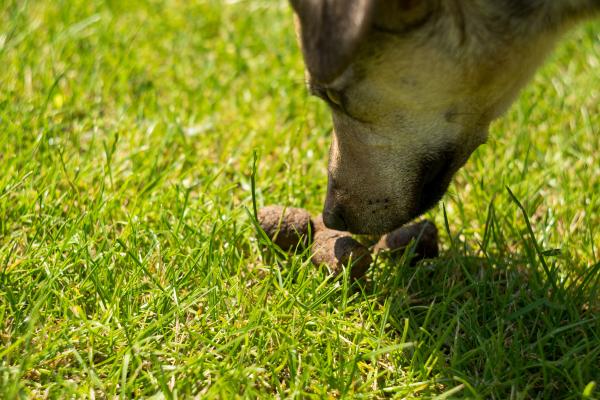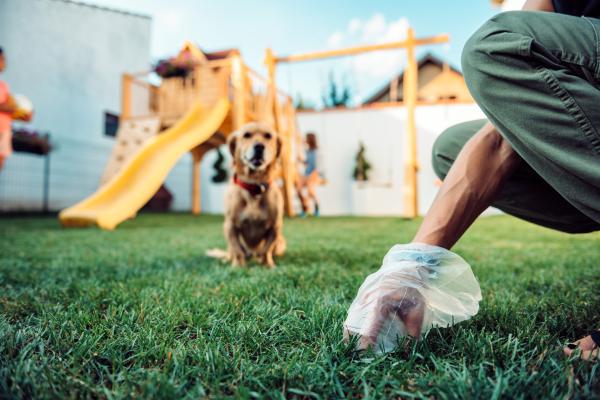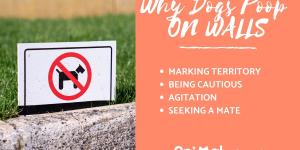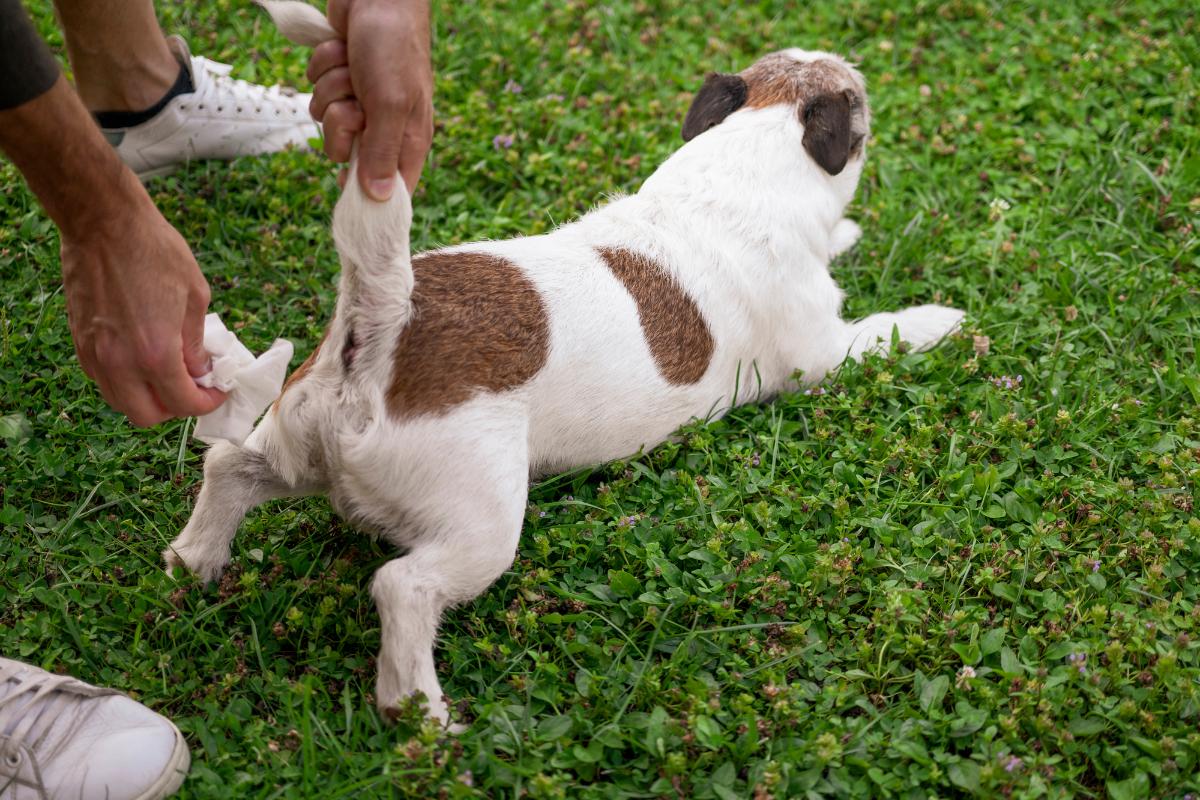Why Does My Dog Eat Poop?



See files for Dogs
A dog eating feces is not necessarily a problem, as long as it is infrequent and the feces itself causes no significant health issue. Frequent consumption of feces is serious health issue and eating feces which is contaminated with pathogens can be cause life-threatening diseases. The consumption of poop from dogs, cats or other animals is known as coprophagia in dogs. It is common in different animals which will enact this behavior for various reasons. Healthy dogs may consume poop, but it is not something which should encourage.
At AnimalWised, we learn more about this behavior by asking why does my dog eat poop? We provide background on the most common causes of this behavior, what are the consequences of eating feces and how we can stop this behavior.
Coprophagia in dogs
Coprophagia in dogs can be a perplexing behavior. It refers to the act of dogs consuming their own feces or that of other animals. It is a behavior that has puzzled dog owners and experts alike for many years. While it may appear revolting to us as humans, coprophagia is actually quite common among canines. Understanding its underlying reasons can shed light on this peculiar behavior.
From an evolutionary perspective, coprophagia in dogs may have roots in their wild ancestors. Wild dogs and wolves would consume the entire carcass of their prey, including the intestines. This behavior served various purposes. These included obtaining additional nutrients and preventing the spread of diseases that may be present in the feces. Although domesticated dogs have evolved from wolves, some vestiges of this ancestral behavior may still be present in their genetic makeup.
While coprophagia is not necessarily harmful to dogs, it can pose health risks. Consuming feces can expose dogs to parasites, bacteria, and viruses, which may lead to gastrointestinal infections or other health issues. It is crucial for dog owners to discourage this behavior and take preventive measures, such as proper waste management and providing a well-balanced diet.
Understanding the reasons behind coprophagia in dogs can help dog owners address the behavior appropriately. Consulting with a veterinarian or a professional dog trainer can provide valuable guidance and strategies to manage and discourage coprophagia. With patience, consistency, and a proactive approach, it is possible to help dogs overcome this peculiar behavior and ensure their overall wellbeing.
Learn more about dog feces with our article on why does my dog's poop start solid then go soft?
Why do dogs eat their own poop?
Although coprophagia in dogs may have roots in the wild ancestors of canines, this doesn't always explain why does my dog eat poop? Dogs in the domestic environment have their needs catered to by their guardians. Even so, there are reasons why dogs will eat feces. This can be due to deficiencies in our level of care, issues with their environment or even psychological problems from various sources.
The following are some of the common reasons dogs eat their own poop:
- Nutritional deficiencies: the most common reason a dog will eat poop and directly related to the type of food we offer. If you review how much food you feed your dog and observe a high percentage of grains, you perhaps have found the cause of this behavior. In order to be able to correctly digest grains, the dog's body needs an enzyme called amylase, which is responsible for assimilating the starch of this food. However, the dog does not produce a large amount, so they are not able to digest a high percentage of cereals. For this reason, if they eat feces, they will receive the enzymes and trace elements necessary to be able to synthesize the amylase in their food. A high percentage of cereals or grains leads to obesity and causes our dog to suffer behavioral problems related to hyperactivity as well as an excess of sugar and cortisol in the blood.
- They want attention: strangely enough, if we completely ignore our dog at the dog park or on a walk, they are likely to try to get our attention in some way. If nothing works, they may resort to eating feces. Ask yourself if you pay enough attention during your walks. In addition, once your dog has eaten feces, the first thing you will do is to scold them to prevent them from eating it. This will reinforce this behavior
- Digestive problems: if your dog has frequent vomiting and/or diarrhea, it will mean they have some type of gastrointestinal problem. Sometimes the difficulties they suffer trying to eat properly make them prefer to eat soft food. If we only provide dry feed, they may eat feces as they believe it will be easier to digest and won't exacerbate the problem further.
- Too much time alone: if your dog spends many hours alone, they may eat their own feces out of boredom. Boredom can lead to stress which can lead to various behavioral problems, including stereotypies. These are behaviors which do not seem to have much purpose. Pica in dogs is a stereotypy where they eat something they shouldn't which can include feces.

- Hygiene: if your dog is especially clean, they may decide to eat feces in order to prevent their environment from becoming dirty. If we leave the dog outside or in a kennel and do not clean up their feces, they may be eating it because they fear they will become ill. Providing a clean and hygienic environment is an important responsibility which ensures we meet the five freedoms of animal welfare.
- Hunger: truly hungry dogs will not hesitate to eat their own feces or that of other animals and even humans. This is a very unlikely and we should be aware if we are not feeding our dog enough. When a dog is hungry all the time, it could be a result of a disease or environmental issue.
- Postnatal behavior: if your dog has just delivered puppies and you see the mother eat their poop, don't worry. This is an important hygiene behavior since they will remain in their nesting area while caring for the newborns. Puppies also cannot poop on their own, so it is common to see the mother licking their anus to help stimulate elimination and then eat the feces directly.
- Curiosity: this is especially common in puppies. They can explore and eat the feces of another pet or their own feces. They can find them an appetizing flavor and for that reason they are eaten. Do not forget that if they do it very often you will need to review their daily food intake even go to your veterinarian.
- Negative reinforcement: if we use punishment regularly with our dog when defecating at home or we push their snout to the feces, the dog can eat to avoid our anger. Avoid negative behaviors and only use positive reinforcement for dogs in training and education.
- Disease: if you notice that the causes are serious, they may be derived from an illness or if you simply cannot identify the causes go to your veterinarian of confidence to help you solve the problem.
Why do dogs eat poop from other animals?
Although some of the basic behaviors will be the same, there may be some more specific reasons why a dog will eat feces from another animal. This type of coprophagia in dogs is often caused by the following:
- Scent and taste attraction: dogs have a highly developed sense of smell, and the scent of feces from other animals can be enticing to them. The taste may also be appealing, which can lead to consumption. This may depend on what the animal has eaten.
- Dominance or territory marking: in some cases, dogs may eat the feces of other animals to assert dominance or mark their territory. This behavior can be more common in intact (unneutered or unspayed) dogs.
- Cleaning behavior: dogs have an instinctual urge to keep their immediate surroundings clean. Eating the feces of other animals, especially in their living area, may be an attempt to maintain cleanliness.
- Curiosity: dogs are naturally curious animals. The presence of feces from other animals can pique their interest, leading them to investigate and potentially consume it.
It's important to note that coprophagia can pose health risks for dogs. It exposes them to potential parasites, bacteria, and viruses. Understanding the underlying reasons for this behavior can help dog owners take appropriate measures to discourage coprophagia and ensure their animal's wellbeing.
Dangers of a dog eating poop
When a dog engages in coprophagia, or the consumption of feces, there are several risks and potential consequences associated with this behavior. These risks include:
- Gastrointestinal infections: feces can harbor various bacteria, viruses and parasites that can cause gastrointestinal infections in dogs. These infections may lead to symptoms such as vomiting, diarrhea, abdominal pain, and loss of appetite.
- Transmission of parasites: feces from other animals, particularly those infected with parasites such as worms (e.g., roundworms and hookworms) or protozoa (e.g. giardia), can transmit these parasites to dogs. This can result in intestinal infestations, which may require veterinary treatment to eliminate. Learn more with our article on roundworms in dogs.
- Spread of diseases: some diseases can be transmitted through fecal matter. For instance, the feces of infected animals may contain pathogens like parvovirus or salmonella, which can be contagious and pose serious health risks to dogs.
- Nutritional imbalances: while the act of eating feces may be an attempt to obtain additional nutrients, the nutritional value of feces is generally low. By consuming feces, dogs may not be getting the proper nutrients their bodies need. This can lead to nutritional imbalances or deficiencies over time.
- Behavioral issues: coprophagia itself can become a problematic behavior. If dogs are repeatedly reinforced or rewarded for this behavior, it may become ingrained and challenging to break. Moreover, coprophagia can be a sign of underlying behavioral issues such as boredom, stress, or anxiety, which should be addressed to prevent further problems.
- Reinfection risk: if a dog is already infected with intestinal parasites and consumes its own feces or that of other animals, it can lead to reinfection or the spread of the parasites to other parts of the body.
To mitigate these risks, it is crucial for dog owners to discourage coprophagia and take preventive measures. This includes proper waste management, keeping the dog's living area clean, providing a well-balanced and nutritious diet, and addressing any underlying behavioral or health issues through consultation with a veterinarian or professional dog trainer.

How to prevent a dog from eating poop?
Here are some practical tips to help you discourage your dog from eating their own poop or feces from other animals:
- Consistent supervision: keep a close eye on your dog during walks and outdoor activities to prevent them from having access to feces. Promptly redirect their attention to other activities or objects if they show interest in investigating or consuming feces.
- Immediate cleanup: promptly remove and dispose of your dog's feces from their living area or during walks. By eliminating the presence of feces, you reduce the opportunity for your dog to engage in coprophagia.
- Distraction and redirection: engage your dog in interactive play, training sessions or provide them with engaging toys to keep them mentally stimulated and divert their attention away from feces.
- Reinforce basic obedience commands: teach your dog basic commands like ‘leave it’, ‘drop it’ or ‘no’. By reinforcing these commands, you can redirect their behavior when they show interest in feces and encourage them to focus on more desirable activities.
- Consistent and balanced diet: ensure your dog is receiving a nutritionally balanced diet that meets their specific needs. Consult with a veterinarian to determine if any nutrient deficiencies may be contributing to coprophagia and consider dietary adjustments if necessary.
- Increased exercise and mental stimulation: provide your dog with regular physical exercise and mental enrichment activities to reduce boredom and stress, which can be underlying factors in coprophagia.
- Avoid punishment: avoid scolding, yelling or physically punishing your dog for engaging in coprophagia. This may inadvertently reinforce the behavior or create fear and anxiety in your dog, exacerbating the problem.
- Consultation with a veterinarian: if coprophagia persists despite your efforts, consult with a veterinarian. They can evaluate your dog's overall health, address any underlying medical conditions, and provide specific guidance or recommend behavior modification techniques.
Remember, breaking the habit of coprophagia may take time and patience. By consistently applying these tips and addressing any underlying issues, you can help discourage your dog from consuming their own poop or feces from other animals.

If you want to read similar articles to Why Does My Dog Eat Poop?, we recommend you visit our Behavioral problems category.







